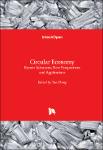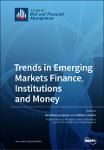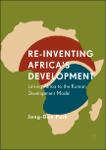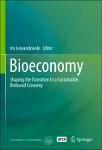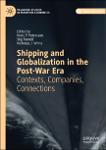Search
Author
- Ryozo, Himino (2)
- Tao, Zhang (2)
- Tetsushi, Sonobe (2)
- Alisher, Mirzabaev (1)
- next >
Subject
- Economics (6)
- Development economics (5)
- Management science (5)
- Economic History (3)
- next >
Date issued
Search Results
This open access book explores the most recent trends in the EU in terms of development, progress, and performance. Ten years after the 2008 economic crisis, and amidst a digital revolution that is intensifying the development race, the European Union, and especially Central and Eastern Europe, are ardently searching for their development priorities. Against this background, by relying on a cross-national perspective, the authors reflect upon the developmental challenges of the moment, such as sustainable development, reducing inequality, ensuring social cohesion, and driving the digital revolution. They particularly focus on the relation between the less-developed Eastern part of the EU and its more developed Western counterpart, and discuss the consequences of this development gap... |
At present, how to develop industries is a burning issue in Africa, where population growth remains high and economic development has thus far failed to provide sufficient jobs for many, especially young people and women. The creation of productive jobs through industrial development ought to be a central issue in steering economic activity across the continent. The authors of this book, consisting of two development economists and five practitioners, argue that the adoption of Kaizen management practices, which originated in Japan and have become widely used by manufacturers in advanced and emerging economies, is decisively the most effective first step for industrial development in Africa. This open access book discusses what Kaizen management is, why it is applicable to Africa, a... |
Nowadays, the restriction of resources and the environment is very severe. A circular economy is the only way to sustainable development, but how this works still needs more exploration. The series of studies carried out by the author are described in detail in this book. |
Since the waves of financial liberalization in the 1980s, emerging market economies have been accessible to foreign investors. Altogether, they contributed up to 43.8% of the global GDP in 2018, and many of them, such as China, India, Bangladesh, Philippines, Myanmar and Vietnam from 2010 to 2019, are among the fastest-growing economies in the world. Given the high economic growth, the assets issued by companies in emerging markets are viewed as a new set of investment opportunities for global investors and fund managers who seek to improve the risk-adjusted performance of their portfolios. In addition to their risky profile due to the lack of transparency as well as stable and matured institutions, their recent development path faces a number of challenges arising not only from the... |
This book looks at the major policy challenges facing developing Asia and how the region sustains rapid economic growth to reduce multidimensional poverty through socially inclusive and environmentally sustainable measures. Asia is facing many challenges arising from population growth, rapid urbanization, provision of services, climate change and the need to redress declining growth after the global financial crisis. This book examines poverty and related issues and aims to advance the development of new tools and measurement of multidimensional poverty and poverty reduction policy analysis. The book covers a wide range of issues, including determinants and causes of poverty and its changes; consequences and impacts of poverty on human capital formation, growth and consumption; asse... |
This open access book analyses the development problems of sub-Sahara Africa (SSA) from the eyes of a Korean diplomat with knowledge of the economic growth Korea has experienced in recent decades. The author argues that Africa's development challenges are not due to a lack of resources but a lack of management, presenting an alternative to the traditional view that Africa's problems are caused by a lack of leadership. In exploring an approach based on mind-set and nation-building, rather than unity – which tends to promote individual or party interests rather than the broader country or national interests – the author suggests new solutions for SSA's economic growth, inspired by Korea's successful economic growth model much of which is focused on industrialisation. This book will be... |
This book defines the new field of "Bioeconomy" as the sustainable and innovative use of biomass and biological knowledge to provide food, feed, industrial products, bioenergy and ecological services. The chapters highlight the importance of bioeconomy-related concepts in public, scientific, and political discourse. Using an interdisciplinary approach, the authors outline the dimensions of the bioeconomy as a means of achieving sustainability. |
This special issue provides a collection of 15 papers with modern theories and applications for circular economy, engineering projects, entrepreneurship models, and investor decisions. After the commencing review on Occupational Health and Safety Management-Systems Standards, follow papers which can be classified into four categories which cover the overall scope of special issue. The first category includes papers regarding the micro-level of circular economy. This means case studies in firm-level which implement different techniques to achieve sustainable development and circular economy goals. The findings reveal interesting achievements which are associated with cultural characteristics of the countries these case studies have been conducted. The second category of papers refers... |
This open access book belongs to the Maritime Business and Economic History strand of the Palgrave Studies in Maritime Economics book series. This volume highlights the contribution of the shipping industry to the transformations in business and society of the postwar era. Shipping was both an example and an engine of globalization and structural change. In turn, the industry experienced and pioneered, mirrored and enabled key developments that led to the present-day globalized economy. Contributions address issues such as the macro-level shift of shipping’s centre of gravity from Europe to Asia, the political and legal frameworks within which it developed, the strategies and performance of both successful and unsuccessful firms, and the links between the shipping industry and the w... |
This volume deals with land degradation, which is occurring in almost all terrestrial biomes and agro-ecologies, in both low and high income countries and is stretching to about 30% of the total global land area. About three billion people reside in these degraded lands. However, the impact of land degradation is especially severe on livelihoods of the poor who heavily depend on natural resources. The annual global cost of land degradation due to land use and cover change (LUCC) and lower cropland and rangeland productivity is estimated to be about 300 billion USD. Sub-Saharan Africa (SSA) accounts for the largest share (22%) of the total global cost of land degradation. Only about 38% of the cost of land degradation due to LUCC - which accounts for 78% of the US$300 billion loss - ... |



